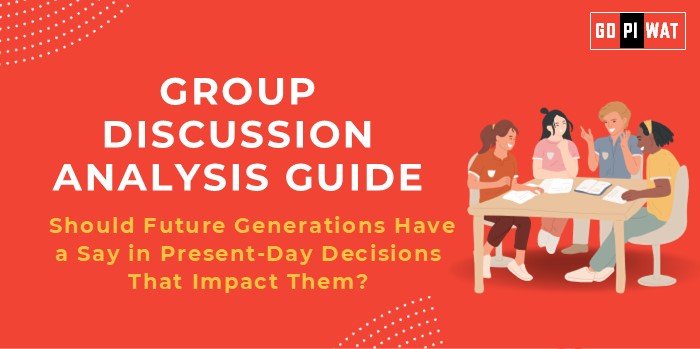📋 Group Discussion Analysis: Should Future Generations Have a Say in Present-Day Decisions That Impact Them?
🌐 Introduction to the Topic
Context Setting:
“Many present-day decisions, from climate policies to economic planning, carry long-term consequences that will significantly affect future generations. This raises the ethical and practical question: Should those who are yet to be born have representation in decisions impacting their lives?”
Topic Background:
This debate originates from growing concerns about intergenerational justice, especially in contexts like climate change, national debt, and biodiversity conservation. The idea has gained traction through frameworks like the United Nations’ Sustainable Development Goals (SDGs), emphasizing the rights of future generations. Countries like Wales and institutions such as the United Nations advocate including future perspectives in policy-making through models like the Well-being of Future Generations Act (2015).
📊 Quick Facts and Key Statistics
- 🌡️ Global Temperature Rise: Predicted to exceed 2°C by 2100 if emissions are not reduced drastically, threatening future generations (IPCC, 2023).
- 💰 Global Debt Levels: $307 trillion as of 2024, burdening future economies (IMF).
- 🌍 UN SDG Adoption: 193 countries committed to long-term sustainable development, emphasizing intergenerational equity.
- 📣 Youth Movements: 70% of youth globally feel governments do not sufficiently consider future impacts (UNICEF, 2023).
🧩 Stakeholders and Their Roles
- 🏛️ Governments: Responsible for policy-making and ensuring sustainability for future populations.
- 🌟 Citizens: Advocates for accountability in policies affecting future generations.
- 🌐 International Bodies: Promote frameworks like SDGs and climate agreements to safeguard long-term interests.
- 🎓 Academic Institutions: Provide research on intergenerational justice and ethical frameworks.
🏆 Achievements and Challenges
✨ Achievements:
- 🏅 Well-being of Future Generations Act: (Wales, 2015) Legally binds public bodies to consider long-term impacts.
- 🌍 Paris Agreement: (2015) Ensures global collaboration to combat climate change.
- 📢 Youth Representation: Initiatives like Fridays for Future elevate youth voices in decision-making.
⚠️ Challenges:
- 🔍 Lack of Institutional Frameworks: Few countries legally account for future impacts.
- 📈 Economic Trade-offs: Immediate economic benefits often outweigh long-term sustainability goals.
- 🤝 Representation Gap: Future generations lack direct participation or formal representation.
🌍 Global Comparisons
- 🇳🇿 New Zealand’s Wellbeing Budget (2019): Prioritizes sustainable and inclusive growth.
- 🇳🇴 Norway’s Sovereign Wealth Fund: Ensures resource revenues benefit future citizens.
Case Study: India’s EIA 2020 Amendments highlight the balance between development and environmental sustainability.
💬 Structured Arguments for Discussion
- Supporting Stance: “Considering future generations ensures sustainable development and ethical accountability.”
- Opposing Stance: “Decisions must prioritize current needs, as predicting future challenges is speculative.”
- Balanced Perspective: “A hybrid model could ensure both current and future priorities are addressed.”
📚 Effective Discussion Approaches
Opening Approaches:
- 📊 Data-Driven Opening: “With $307 trillion in global debt, are we borrowing from the future to fuel our present?”
- 📜 Historical Example: “The failure to address past climate warnings highlights the importance of considering future consequences.”
Counter-Argument Handling:
- 🔄 Rebut economic immediacy arguments by emphasizing sustainable growth benefits.
- 💡 Acknowledge prediction uncertainties while highlighting existing frameworks like the SDGs.
📈 Strategic Analysis of Strengths and Weaknesses
- ✔️ Strengths: Promotes sustainability, ethical governance, and long-term planning.
- ❌ Weaknesses: Speculative predictions, lack of direct representation mechanisms.
- 💼 Opportunities: Use AI for predictive modeling, establish global policies for future inclusion.
- ⚠️ Threats: Economic short-termism, resistance to policy changes.
🏫 Connecting with B-School Applications
Real-World Applications:
- 🌟 Explore sustainability strategies in corporate decision-making.
- 📖 Case studies on long-term financial planning and ESG compliance.
Sample Interview Questions:
- ❓ “How can businesses ensure their operations are sustainable for future generations?”
- ❓ “Discuss a global policy that integrates future generational concerns effectively.”
Insights for B-School Students:
- 🌟 Future-conscious policies enhance corporate social responsibility.
- 🔍 Studying intergenerational equity builds critical decision-making skills for strategic roles.


